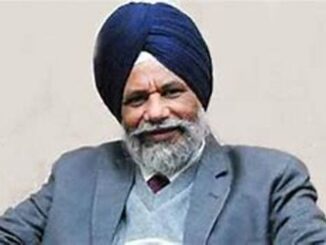

“Mature democracies do not punish apostasy and blasphemy. Let us see how America dealt with the issue of national symbols. The classic American case is that of Texas v. Johnson where the Supreme Court opined that burning of the American flag is protected by the freedom of speech. The court observed that “the right to differ is the centerpiece of our First Amendment freedoms.” Nothing is more important in terms of national symbols than the flag of a country. It is indeed the most visible manifestation of nationhood. Forty-eight of the 50 American States had flag protection laws and all these laws were held as unconstitutional”, says the author.
There is a difference between ‘patriotism’ and ‘nationalism’. It is the former which is compatible with universal liberalism and is an antidote to ‘nationalism’. ‘Constitutional patriotism’ has the potential to reunite India, Pakistan and Bangladesh as for Habermas citizenship does not require that all citizens share the same language or the same religious, ethical or cultural origins. Rabindranath Tagore, author of the national anthem, too did not hesitate in telling Gandhiji that there was a thin line between nationalism and xenophobia and went on to say that to worship my country as God is to bring curse upon it. Tagore was opposed to the triumph of patriotism over humanity and universalism. He was even for ‘destroying nationalism’ to achieve ‘unity of man’. Thus, Dinanath Batra’s suggestion to the Modi government to drop all references to Tagore in textbooks.
How other mature democracies respond to the refusal of saluting the national flag, refusal to sing the national anthem and even burning of the national flag needs to be discussed as Justice Murlidharan of the Madras High Court in order to promote patriotism has made singing of the national song mandatory in all schools, universities and even corporate offices. Neither corporates nor universities have the concept of daily assemblies like schools.
The Madras High Court order is not only an example of judicial overreach but is also based on the flawed idea that patriotism can be inculcated by the force of law. Doubting any citizen’s patriotism is a punishable offence under Section 153B of the Indian Penal Code. In 2016, the apex court had made the playing of the national anthem compulsory in cinema halls but had refused to make the national song singing compulsory. Thus, the Madras High Court went against the Supreme Court and violated the judicial discipline. The court does make an exception for those who have language difficulties or valid objections. But in an era of mob lynching, this exemption will not work. In any case, who will decide on the validity of objections?
In this case the petitioner was just seeking the award of one mark for correctly answering a question in the teacher’s recruitment examination that Bengali is the language in which Vande Matram was originally written. The answer key had wrongly provided Sanskrit as the correct answer. The court rightly ordered the award of one mark to the petitioner but doing anything beyond this was unnecessary.
There are sections of the population which refuse to sing the national anthem and the national song like the Zehovah Witness sect of Christians. While this author personally has no objection, some Muslims do believe that while singing the national anthem does not violate any fundamental belief of Islam, singing the national song would impinge on their religious beliefs under which they cannot worship anyone other than just one God. Not singing the national anthem does not mean that one is not patriotic. In fact, love for one’s country is indeed half of religion in Islam. The test of patriotism is the sacrifice one is willing to make for one’s country. The freedom of religion guaranteed under our Constitution to not only citizens but even to foreigners does permit them to follow core beliefs of their religion. Followers of Jehovah Witness sect do not sing any national anthem anywhere in the world. Do we have any right to impose our views on them? Can courts compel people to change their religious beliefs?
Moreover, Vande Matram was not written for India but for the undivided Bengal which includes today’s Bangladesh. The poem was composed by Bankim Chandra Chattopadhya in 1870 and was included in his novel Anandmath in 1881. In fact, Aurobindo had called it the national anthem of ‘Bengal’. It was first sung by Rabindranath Tagore at the session of the Indian National Congress in 1896. We may disagree with those who are opposed to the singing of Vande Matram but we cannot impose our will on them.
Mature democracies do not punish apostasy and blasphemy. Let us see how America dealt with the issue of national symbols. The classic American case is that of Texas v. Johnson where the Supreme Court opined that burning of the American flag is protected by the freedom of speech. The court observed that “the right to differ is the centerpiece of our First Amendment freedoms.” Nothing is more important in terms of national symbols than the flag of a country. It is indeed the most visible manifestation of nationhood. Forty-eight of the 50 American States had flag protection laws and all these laws were held as unconstitutional.
In certain cases, in America attaching a peace sign to the flag; refusal to salute the flag; and displaying a red flag were also protected. In Smith v. Goguen, wearing pants with a small flag sewn into their seat was held as expressive conduct. The Supreme Court held “neither the United States nor any State may require any individual to salute or express favorable attitudes toward the flag.”
We need not go this far in India. The citizen’s fundamental duties under the Constitution do not mention the national song but talk of reverence to the national anthem. The Prevention of Insults to National Honors Act, 1971, neither mandates ‘standing’ nor ‘signing’ of the national anthem. But it explicitly punishes the burning of the national flag any disrespect to the flag in words or conduct and the national flag includes even a picture or painting of the flag. No Indian disagrees with these provisions. The Indian law has not yet made the singing of even the national anthem compulsory, what to talk of the national song. In the Bijoy Emmanul case three students belonging to the Zehovah Witness sect were expelled from the school for not singing the national anthem. The Supreme Court held that these children were exercising their ‘right to silence’ which is implicit in the freedom of speech. The court said: ‘Our tradition teaches tolerance; our Constitution preaches tolerance. Let us not dilute it.’ Though their expulsion was held bad in law, these children subsequently withdrew from the school and never went to any other school. What a disastrous consequence.
(The author is the Vice-Chancellor of NALSAR University of Law, Hyderabad)





Be the first to comment